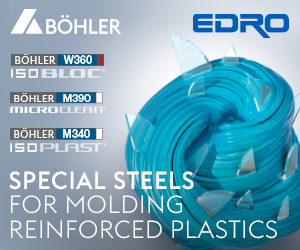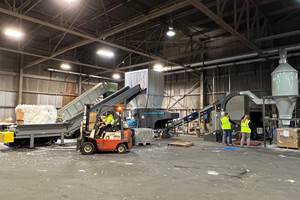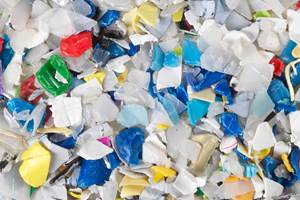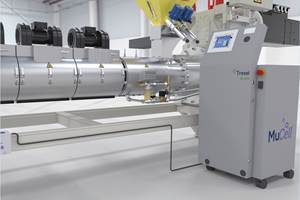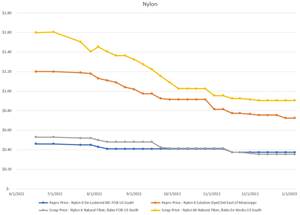Digital Watermarking Consortium Advances Technology for Sorting & Recycling Plastics
Europe’s Digital Watermarks Initiative HolyGrail 2.0 gains new members and advances to Phase II pilot projects.
A consortium of more than 85 European companies across the consumer packaging value chain is proceeding to the next step in its Digital Watermarks Initiative HolyGrail 2.0. This is a pilot project to prove the viability of digital watermarking technologies for accurate sorting and thus higher-quality recycling of packaging materials. Digital watermarks are essentially barcodes, the size of a postage stamp, that are unnoticeable to the naked eye. These are printed repeatedly to cover the surface of a package. They encode a wide range of attributes, including the materials of construction. Once the used package enters a waste-sorting facility, the digital watermark can be detected by a standard high-resolution camera on the sorting line. Based on the attributes “read” by the camera, the package could then be more accurately sorted than by current technologies, such as NIR spectroscopy, which cannot reliably identify multi-material structures.

Digital watermarks the size of a postage stamp, but not perceptible to the naked eye, are repeated all over the product surface, without affecting printed branding and other information.
As reported in a March Close-Up, the first phase of the project concluded in May 2019 with a proof-of-concept sorting trial at Tomra Recycling of Norway. In June of this year, a new project facilitator was named for Phase II of the project, Brussels-based AIM, the European Brands Association (aim.be). The plan is to launch an industrial pilot to validate the technology at an industrial-scale test sorting facility, with brand owners and retailers working together with packaging and technology suppliers to modify their packaging with digital watermarks. One participant, is Mondi, the Austrian-based global producer of paper and plastic flexible packaging. A founding member of the HolyGrail Pioneer Project, it now lans to conduct full-scale industrial trials with key customers in the near future. Another original member of the project, Dutch IML specialist Verstraete IML, was elected in September to be one of the 11-member HolyGrail 2.0 Leadership Team.
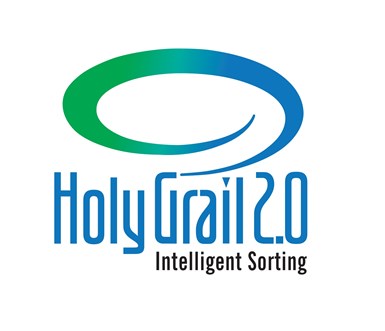
Also in September, German extrusion specialist Reifenhäuser joined the Digital Watermarks project as part of the R-Cycle initiative (r-cycle.org). R-Cycle is the open, global tracing standard for the entire life cycle of plastic packaging. The overall goal is to ensure recyclability by seamless documentation of all recycling-relevant packaging properties in a cloud database accessed via a digital watermark. Underway for two and half years, the R-Cycle project was presented at K 2019 and has developed the capability to map all recycling-related data digitally during film extrusion, converting and package filling and provide all this information to third parties via the internet. Together with various partners, Reifenhäuser has set up a functioning data platform that is connected to production lines. Reifenhäuser and other R-Cycle members have several pilot projects underway with major resin suppliers, brand owners, retailers and independent institutes. The projects focus on development of recyclable and recyclate-containing recipes, marking technologies, and deployment of the standardized data system. Along with Reifenhäuser, R-Cycle presently includes Arburg, Brückner Maschinenbau, Kautex and the Institute for Plastics Processing (IKV) at RWTH Aachen University in Germany.
Related Content
Purpose-Built System Enhances Capacity and Flexibility for Recycler
A Boston recycler invested in a turnkey shredding, granulation and elutriation system to expand its plastics reclaim business.
Read MoreLooking to Run PCR on a Single Screw? Here’s What to Keep in Mind
Just drop it in and mix it up? Sorry, there’s a lot more to it than that. Here is some of what you need to consider.
Read MoreFoam-Core Multilayer Blow Molding: How It’s Done
Learn here how to take advantage of new lightweighting and recycle utilization opportunities in consumer packaging, thanks to a collaboration of leaders in microcellular foaming and multilayer head design.
Read MoreRecycled Material Prices Show Stability Heading into 2023
After summer's steep drop, most prices leveled off in the second half.
Read MoreRead Next
New Product ID Technologies For Industry, Retail & Recycling
Confirming material composition and manufacturing source, anti-counterfeiting, waste sorting, and retail check-out scanning may all get a boost from new ID technologies.
Read MoreMaking the Circular Economy a Reality
Driven by brand owner demands and new worldwide legislation, the entire supply chain is working toward the shift to circularity, with some evidence the circular economy has already begun.
Read MoreFor PLASTICS' CEO Seaholm, NPE to Shine Light on Sustainability Successes
With advocacy, communication and sustainability as three main pillars, Seaholm leads a trade association to NPE that ‘is more active today than we have ever been.’
Read More










 (2).jpg;maxWidth=300;quality=90)



